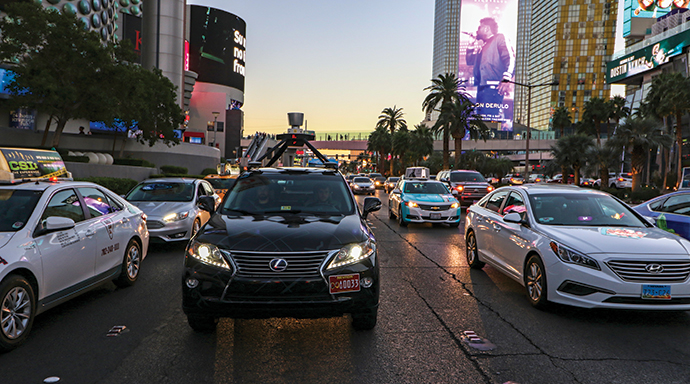They say that what happens in Vegas, stays in Vegas. But that is certainly not the case with autonomous vehicles, which are proliferating on the Strip faster than Elvis impersonators.
Having already passed the 60,000-ride mark for Lyft runs in Vegas this year, Aptiv is taking what they’ve learned on the Strip and using it to perfect the technology that one day will power self-driving cars and trucks worldwide.
The Las Vegas-based Aptiv already has self-driving cars motoring through the streets of Boston, Pittsburgh and Singapore, and soon will have them navigating the roads of China. Much of what the company is learning from autonomous Lyft rides in Nevada is being shared with operators in these other locations.
“Companies like Aptiv and Torc are drawn to Nevada due to the AV-friendly laws adopted by the state.”
“I’m proud of Aptiv’s excellence in driverless technology — starting from our R&D roots at MIT and Carnegie Mellon, through our present-day operation in Las Vegas of the largest commercial self-driving mobility service in the world, which has provided more than 60,000 self-driving rides to passengers on the Lyft network,” wrote Karl Iagnemma, president of Aptiv Autonomous Mobility, in a September 5 blog. “Autonomous driving technology has evolved at a dramatic rate over the past several years.”
So has the entire industry cluster of autonomous systems companies in Southern Nevada. In addition to the 5-series BMW’s being operated by Aptiv on the streets of Vegas, Virginia-based Torc Robotics has operated its own self-driving vehicle, the Lexus SUV called Asimov, in various test runs through the bustling entertainment capital of the world. Companies like Aptiv and Torc are drawn to Nevada due to the AV-friendly laws adopted by the state.

Those business-friendly laws extend to the rapidly growing unmanned aerial systems cluster as well. The defense and aerospace cluster historically has been a key cog in the Southern Nevada regional economy, and today that sector is growing thanks to UAS. Nevada is one of six locations that the FAA has selected to be a center for UAS development in the U.S. A recent study showed that UAS could have a $2.5 billion annual economic impact in Nevada and contribute an estimated $125 million in state and local tax revenue per year.
Among other reasons UAS firms like to do business in the region, Southern Nevada has:
- A climate that is ideal for testing and R&D, with 320 days of sunshine and among the most predictable weather patterns in the nation.
- Low costs of startup and operation.
- An abundance of affordable commercial real estate sites near designated UAV airports.
- Competitive utility rates for commercial operations. Robust data storage capacity, cloud computing resources and I.T. providers.
Nevada, by being the first state to integrate UAVs into its National Guard program and the first to license autonomous cars on public roads, is the birthplace of the UAS industry.
Nevada also offers tax abatements on aircraft parts. In 2015, the Nevada Legislature passed AB 161, a bill that reduces the tax burden on aviation businesses. The bill authorizes aviation firms, with the assistance of the Las Vegas Global Economic Alliance, to apply to the Nevada Governor’s Office of Economic Development for a partial abatement of personal property or sales and use taxes. The tax break may be applied to eligible companies for up to 20 years.
Multiple UAS companies thrive in Southern Nevada thanks to this legislation and other pro-business policies enacted by the state. They include Unmanned Systems Inc. in North Las Vegas, ArrowData in Las Vegas, and Dronesmith Technologies in Henderson.

